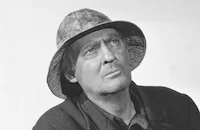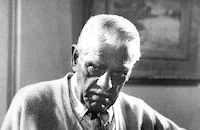The Unholy Night

Brief Synopsis
Cast & Crew
Lionel Barrymore
Ernest Torrence
Roland Young
Dorothy Sebastian
Natalie Moorhead
Sidney Jarvis
Film Details
Technical Specs

Synopsis
Perceiving a pattern in the mysterious deaths of four members of an English regiment, Sir James Rumsey of Scotland Yard calls together the surviving members of the regiment in the hope of solving the murders. While they are assembled at the Montague mansion, Lady Efra, the daughter of the late Marquis of Cavendar, who was thrown out of the regiment for misconduct, arrives with her father's will. Dividing his vast fortune among Efra and the members of the regiment, and making them guardians of his daughter, Cavendar hopes to harvest his lifelong hatred by causing the regiment to fight over his money and his daughter. Each officer is suspected of being the murderer until Rumsey discovers, through a fake seance, that Efra and Mallory, one of the officers, plan to murder the whole regiment and take possession of the fortune.

Director

Lionel Barrymore
Cast

Ernest Torrence

Roland Young

Dorothy Sebastian

Natalie Moorhead
Sidney Jarvis

Polly Moran
George Cooper
Sojin

Boris Karloff
Claude Fleming
Clarence Geldert

John Miljan
Richard Tucker

John Loder
Philip Strange
John Roche
Lionel Belmore
Gerald Barry
Richard Travers
Crew

Film Details
Technical Specs

Articles
The Unholy Night
The Unholy Night (1929) takes place almost entirely in the confined space of wisecracking aristocrat Montague's spacious home, a claustrophobic staging that may partly account for the film's theatrical stodginess, often a problem in early talkies. It was declared 'an all-talker and a 100% lemon' by Variety upon its release.
The film was written by Ben Hecht (and originally titled The Green Ghost); it was only his second film credit after Underworld (1927). Hecht's initial ambition was to become a novelist, but his success writing for the theater and movies lured him to Hollywood. Hecht was a friend, not only of Lionel Barrymore, but of his younger brother John and sister Ethel.
Director Barrymore, whose career began to take off in the sound era, was considered an innovator in the early talkie genre, inventing (simultaneously, along with several other industry figures) an emancipating sound boom. Barrymore was also notable for not going overboard with the fresh novelty of sound with the kind of constant music and chatter that marred some productions, and instead allowed silence to also intrude in his films when necessary.
The Unholy Night was Boris Karloff's second talkie following 1929's Behind That Curtain. Barrymore had first cast Karloff as a sideshow mesmerist in 1926 in The Bells, Karloff's first film containing horror elements. Barrymore offered Karloff a slightly larger role as the Hindu servant Abdoul in The Unholy Night. But such small parts, performed well, were not the needed career-boost for Karloff. Already in his 40s, Karloff said he had stopped writing home because 'I had nothing to write about.' Nevertheless, Karloff enjoyed working with Barrymore and in the biography The Barrymores: The Royal Family in Hollywood, recalled that "In those days, it took several hours to light a set and Lionel would use this time to help me and other players improve our scenes...When I played my big scene, finding my dead wife, I realized Lionel had analyzed the scene inside out and given me hints that enhanced my own interpretation."
Despite an inability to break through with larger roles and film fame, Karloff was encouraged by a meeting with Lon Chaney after The Bells in which the actor told Karloff not to be discouraged and to stick with playing unusual roles. Karloff, who was generally cast in small parts as 'heavies' finally achieved his first starring role and film immortality when he appeared in James Whale's Frankenstein (1931) at age 44; the seventy-ninth of Karloff's 163 film roles.
Though born to a respectable middle-class British family and groomed for some respectable career as a civil servant, Karloff's name became forever tied to that influential movie monster with his characteristically Karloff mix of menace and vulnerability. After years and years of struggle, Karloff may have been one of the few actors, unlike Peter Lorre or Bela Lugosi, who welcomed his horror typecasting, and audiences, surprisingly, warmed to him too, detecting the kindly actor beneath monster make-up.
Also in The Unholy Night cast as the duplicitous Lady Efra was former showgirl Dorothy Sebastian, known as 'Slam' to her friends for her proclivity for merry drunkenness. Sebastian later went on to co-star with and become the mistress of Buster Keaton.
Director: Lionel Barrymore
Screenplay: Joseph Farnum, Dorothy Farnum, Ben Hecht (story), Edwin Justus Mayer, Jacques Feyder (play)
Cinematography: Ira H. Morgan
Film Editing: Grant Whytock
Art Direction: Cedric Gibbons
Music: William Axt
Cast: Ernest Torrence (Dr. Ballou), Roland Young (Lord Montague), Dorothy Sebastian (Lady Efra Cavander), Natalie Moorhead (Lady Violet Montague), Sydney Jarvis (Jordan), Polly Moran (Polly), Sojin (Mystic), Boris Karloff (Abdoul).
BW-93m.
by Felicia Feaster

The Unholy Night
Quotes
Trivia
Notes
The Unholy Night was also produced in a French-language version entitled Le spectre vert. That film was directed by Jacques Feyder and starred André Luguet and Jetta Goudal.














